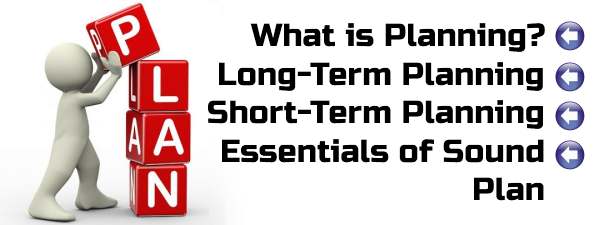Planning | Meaning | Kinds | Essentials of Sound Plan
Table of Contents
What is Planning?
Planning is, an all-pervasive and the most basic function of management. Planning is a process whereby one can determine the future action expected result. Planning means deciding in advance what to do, when to do it, hear to do it, and who is to do it.

Planning bridges the gap from where we are, to where we want to go. Planning is an intellectual process. It is the process of thinking before doing. Planning is the first function and the top executive must do planning before he can intelligently perform any of the other managerial functions.
Kinds of Planning
- Long-term planning, and
- Short-term planning.
Let us discuss them in brief.
1. Long-term planning
Long-term planning is more important because it has far reaching effects. The management and special planning officials are involved in this. Long-term planning involves determination of goals to be achieved by the organization and the right strategies to be adopted to achieve the goals, over a long period of time. These goals generally relate to sales and market share, the range of products and types of distribution channels, the lines of business which the enterprise should go in, etc.
By means of long range planning, the enterprise takes a hard look at its present product line, markets, competition and technology and relate them to its long range goals.
2. Short-term Planning
Short range plans are usually made for a period of one year or less. These plans are normally subdivided into monthly or weekly plans for control purposes. Short-term plans are prepared in a very detailed manner. Short range planning deals with such things as adjusting prices, buying for the next season and handling day-to-day problems of the sales force. Lower and middle-class men are entrusted with this work.
Mostly, the short-term plans are in the form of budgets. The budgets for sales, amount of expenditure incurred on advertising, sales promotion, etc., are normally prepared in this type. Periodically, the budgeted performance is compared with actual performance to see whether the budgets are being met, and to take corrective steps if the performance has not been up to the mark.
Essentials of a Sound Plan
Plans are formulated with a view to achieve organizational goals. A good plan will be one that enables the management to achieve its goals.
A good plan should have the following essentials:
1. It should be simple and clear.
2. It should be easily understandable to the followers.
3. It should be prepared on the basis of clearly defined objectives.
4. It should cover all aspects that are needed for the fulfillment of the objectives.
5. It should be flexible to changing situations.
6. It should be as economical as possible.
7. It should be adaptable.
8. It should provide standards for the evaluation of actual performance.
9. It should provide a basis for decentralization of its various activities.
10. It should guide decision-making.

